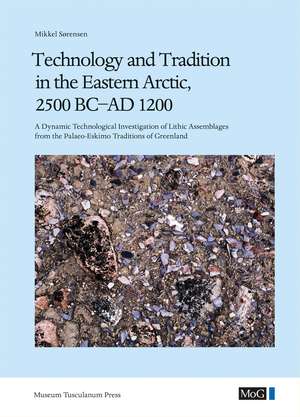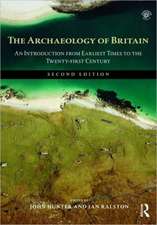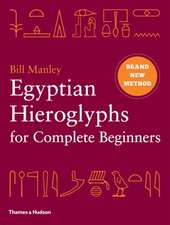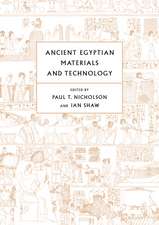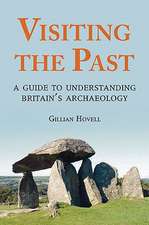Technology and Tradition in the Eastern Arctic, 2500 BC-AD 1200: A Dynamic Technological Investigation of Lithic Assemblages from the Palaeo-Eskimo Traditions of Greenland
Autor Mikkel Sørensenen Limba Engleză Hardback – 14 mar 2012
Introducing a new dynamic technological methodology to Arctic archaeology, Technology and Tradition in the Eastern Arctic provides a comprehensive overview of lithic stone-tool production—the lithic chaînes opératoires—in Palaeo-Eskimo groups of the easternmost Arctic. Beginning with a survey of the various kinds of lithic materials available in the region, Mikkel Sørensen examines the tool-making process—from procurement of raw materials, through production, use, modification, and eventual discarding—of each of the Palaeo-Eskimo tool types. As a result, the formal tool types of several Palaeo-Eskimo cultures of Greenland are defined, and two previously unknown cultures are identified in the Thule region. The book successfully demonstrates the efficacy of the dynamic technological methodology in researching the prehistory of the Palaeo-Eskimo culture.
Preț: 479.69 lei
Preț vechi: 580.64 lei
-17% Nou
Puncte Express: 720
Preț estimativ în valută:
91.79€ • 95.83$ • 75.97£
91.79€ • 95.83$ • 75.97£
Carte disponibilă
Livrare economică 15-29 martie
Preluare comenzi: 021 569.72.76
Specificații
ISBN-13: 9788763531672
ISBN-10: 8763531674
Pagini: 418
Ilustrații: 58 color plates, 11 halftones, 25 maps, 59 graphs, 20 tables
Dimensiuni: 197 x 270 x 33 mm
Greutate: 1.47 kg
Editura: Museum Tusculanum Press
Colecția Museum Tusculanum Press
ISBN-10: 8763531674
Pagini: 418
Ilustrații: 58 color plates, 11 halftones, 25 maps, 59 graphs, 20 tables
Dimensiuni: 197 x 270 x 33 mm
Greutate: 1.47 kg
Editura: Museum Tusculanum Press
Colecția Museum Tusculanum Press
Notă biografică
Mikkel Sørensen is a postdoctoral fellow at the Department of Archaeology, University of Copenhagen.
Cuprins
Abstract
Acknowledgements
Chapter 1: Introduction
Aims
Two observations
The problem
Former technological analyses in Arctic archaeology
Chapter 2: Methodology
The terminology—the researcher's tools
The topic—the preconditions
The material—the physical level
The chaînes opératoires
The ideas—the conceptual level
Direction—towards a technological recognition of a prehistoric society
The perspective—the way we perceive and the consequences
The methods of examination
The procedure
How the chaînes opératoires and the prehistoric reduction method is analyzed: Two examples
Chapter 3: Geology and lithic raw material from a Palaeo-Eskimo perspective in Greenland
Microcrystalline quartz
Metamorphosed rock types (killiaq)
Other rock types that give conchoidal fractures
Occurrences of lithic raw materials that give conchoidal fractures in Greenland
Conclusion
Chapter 4: Lithic technology in the Palaeo-Eskimo cultural groups in Greenland
4.1 Lithic technology in Saqqaq
4.2 Lithic technology in Independence I
4.3 Lithic technology in Dorset I
4.4 Lithic technology in Independence II
4.5 Lithic technology in Late Dorset
4.6 Other Palaeo-Eskimo traditions in Greenland
Chapter 5: Discussion
Choice of raw materials
Heat treatment
Procurement of the lithic raw materials
The manufacture of the lithic tool assemblage: Typology
Reduction: Method, technique, hafting and tradition
Burin technology: The technological marker of the Palaeo-Eskimo traditions
Regional traditions or 'cousins'?
The methodology: Advantages and problems
Source criticism
Chapter 6: Greenland's prehistory interpreted on the basis of analyses of lithic technology
Arctic Small Tool tradition: The Denbigh flint complex
The Early Palaeo-Eskimo regional traditions in the easternmost Arctic: Independence I and Saqqaq
The origin of Saqqaq and Independence I
Saqqaq's regional settlement
Independence I's regional settlement
Overlap in the geographical settlement between Saqqaq and Independence I
Saqqaq's development
Dorset: The Canadian connection and the second circum-population of Greenland
Greenlandic Dorset's immigration route to East Greenland
Greenlandic Dorset's development
Late Dorset: the last Palaeo-Eskimo society in the Arctic
The gateway to Greenland: the region with the greatest diachronic cultural diversity in the eastern Arctic
Conclusion
Chapter 7: The usefulness of the technological methodology and future possibilities in Arcticarchaeology
The cultural history
Culture-historical perspectives
The methodology
Methodological perspectives
Chapter 8: Appendix
1. Scientific experimental studies of Palaeo-Eskimo lithic technology
2. Catalogue—studied lithic artefacts
Bibliography
Acknowledgements
Chapter 1: Introduction
Aims
Two observations
The problem
Former technological analyses in Arctic archaeology
Chapter 2: Methodology
The terminology—the researcher's tools
The topic—the preconditions
The material—the physical level
The chaînes opératoires
The ideas—the conceptual level
Direction—towards a technological recognition of a prehistoric society
The perspective—the way we perceive and the consequences
The methods of examination
The procedure
How the chaînes opératoires and the prehistoric reduction method is analyzed: Two examples
Chapter 3: Geology and lithic raw material from a Palaeo-Eskimo perspective in Greenland
Microcrystalline quartz
Metamorphosed rock types (killiaq)
Other rock types that give conchoidal fractures
Occurrences of lithic raw materials that give conchoidal fractures in Greenland
Conclusion
Chapter 4: Lithic technology in the Palaeo-Eskimo cultural groups in Greenland
4.1 Lithic technology in Saqqaq
4.2 Lithic technology in Independence I
4.3 Lithic technology in Dorset I
4.4 Lithic technology in Independence II
4.5 Lithic technology in Late Dorset
4.6 Other Palaeo-Eskimo traditions in Greenland
Chapter 5: Discussion
Choice of raw materials
Heat treatment
Procurement of the lithic raw materials
The manufacture of the lithic tool assemblage: Typology
Reduction: Method, technique, hafting and tradition
Burin technology: The technological marker of the Palaeo-Eskimo traditions
Regional traditions or 'cousins'?
The methodology: Advantages and problems
Source criticism
Chapter 6: Greenland's prehistory interpreted on the basis of analyses of lithic technology
Arctic Small Tool tradition: The Denbigh flint complex
The Early Palaeo-Eskimo regional traditions in the easternmost Arctic: Independence I and Saqqaq
The origin of Saqqaq and Independence I
Saqqaq's regional settlement
Independence I's regional settlement
Overlap in the geographical settlement between Saqqaq and Independence I
Saqqaq's development
Dorset: The Canadian connection and the second circum-population of Greenland
Greenlandic Dorset's immigration route to East Greenland
Greenlandic Dorset's development
Late Dorset: the last Palaeo-Eskimo society in the Arctic
The gateway to Greenland: the region with the greatest diachronic cultural diversity in the eastern Arctic
Conclusion
Chapter 7: The usefulness of the technological methodology and future possibilities in Arcticarchaeology
The cultural history
Culture-historical perspectives
The methodology
Methodological perspectives
Chapter 8: Appendix
1. Scientific experimental studies of Palaeo-Eskimo lithic technology
2. Catalogue—studied lithic artefacts
Bibliography
